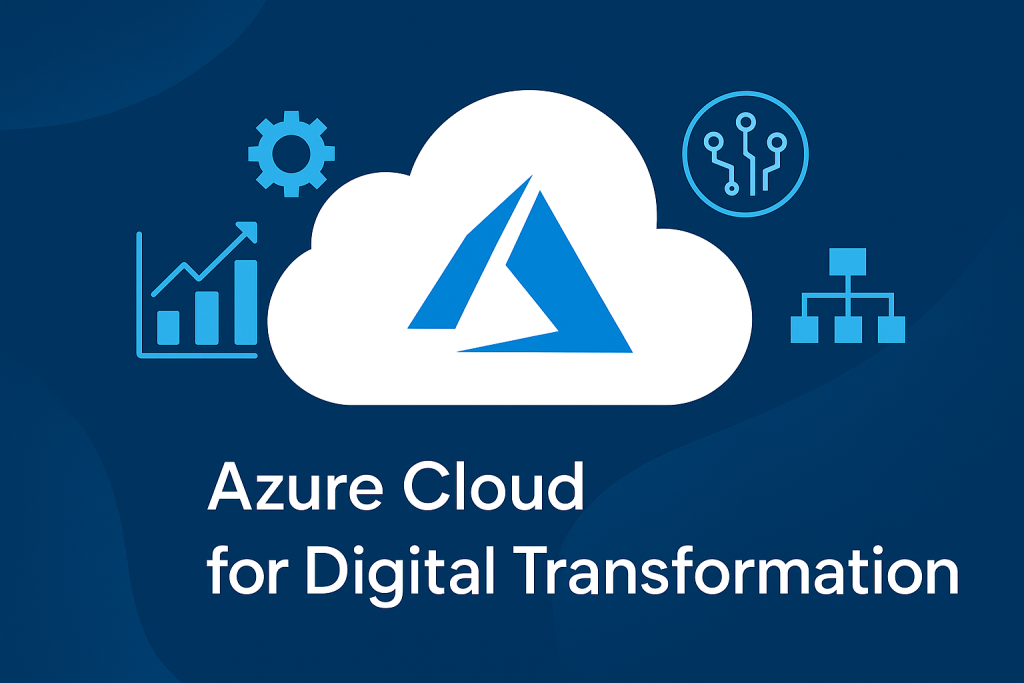
The pace of change in today’s business world is rapid, and staying competitive means being able to adapt fast. Consequently, digital transformation is no longer just a strategy—it is essential for companies to keep up. Therefore, that means finding solutions that can scale, stay secure, and flex with your needs. Fortunately, Microsoft Azure is helping many businesses do exactly that. It offers a wide range of tools and services designed to support everything from daily operations to long-term innovation. In this blog, we will look at how Azure cloud supports digital transformation and why it is a strong option for organizations aiming to improve efficiency and build for the future.
Role of Cloud in Digital Transformation
Before exploring what sets Azure apart, it helps to first understand the cloud’s role in digital transformation. At its core, the cloud gives businesses the flexibility to grow, act on real-time data, and streamline operations through automation. It creates the foundation for faster innovation and better customer experiences.
From updating legacy systems to rolling out AI or connecting global teams—the cloud makes it all possible and manageable. But not all cloud platforms offer the same level of capability or support. That’s where Azure makes a real difference.
Azure’s Global Reach and Scalability
To begin with, one of the things that sets Azure apart is how far its network stretches. With data centers in over 60 regions, Azure lets businesses run applications close to their users. As a result, this means faster performance and better alignment with local data privacy and compliance rules—no matter where you operate.
Scalability is another key strength. Whether you are just starting out or running a large-scale operation, Azure adjusts to your needs. You can easily scale up or down,add more computing power, expand databases, or spin up containers without overhauling your setup. It is the kind of flexibility that supports both rapid growth and long-term stability.
Security and Compliance You Can Trust
Security is at the heart of any digital transformation journey and Azure delivers on that with enterprise-grade protection built into every layer of its platform. Here is how Azure helps keep your data and operations secure:
- Multi-layered security: From encryption to advanced threat detection and identity management, Azure protects your data at every step.
- Compliance certifications: Azure meets strict regulatory standards including GDPR, HIPAA, ISO 27001, and FedRAMP, making it suitable for businesses with complex compliance needs.
- Azure Security Center: A centralized tool that gives you real-time insights and control, so you can manage security across all your resources from one place.
For businesses in highly regulated industries like finance, healthcare, or government, Azure offers the reliability and peace of mind needed to move forward confidently without compromising on security or compliance.
AI and Machine Learning Capabilities
Azure brings the future of AI and machine learning within reach, offering powerful, easy-to-use tools that help businesses innovate and grow.
AI Services – See and understand the world like never before with advanced computer vision and natural language processing.
Machine Learning – Build, train, and deploy intelligent models faster, turning data into actionable insights.
Cognitive Services – Bring AI to life in your apps with smart chatbots, personalized recommendations, and more.
With Azure, you can automate tasks, uncover hidden patterns in your data, and create seamless, engaging experiences for your customers. Let AI do the heavy lifting, so you can focus on what matters most.
Seamless Integration with Microsoft Ecosystem
One of the best things about Azure is how well it works with other Microsoft products like Office 365, Dynamics 365, Power BI, and Microsoft Teams. This helps businesses run more smoothly and get more done by making the workplace more unified and collaborative.
Moving to Azure is a natural step for businesses that are already part of the Microsoft ecosystem. Single Sign-On (SSO) and Active Directory integration make security and identity management more centralized and secure, which reduces problems during the transition.
Hybrid and Multi-Cloud Support
Azure stands out because it has strong support for hybrid cloud and multi-cloud environments. Businesses can use Azure Arc and Azure Stack to manage their workloads across their own data centers, Azure, and even other public cloud providers.
This is especially helpful for businesses that are going through a phased digital transformation and need to keep some apps on-premise because of latency, security, or compliance issues. Azure’s hybrid features make sure that management, governance, and security are the same in all environments.
DevOps and Continuous Innovation
Azure supports DevOps, which speeds up software delivery by:
- Azure DevOps (CI/CD pipelines, planning in an agile way)
- GitHub integration makes it easy to work on code together.
- AKS provides Kubernetes support for containerized apps.
This speeds up the development process and encourages new ideas.
Cost-Effective and Flexible Pricing Models
Digital transformation can take a lot of time and money, especially for big businesses. Azure has different pricing plans that let businesses pay only for what they use. Companies can save a lot of money on cloud services without sacrificing performance by using features like reserved instances, spot pricing, and autoscaling.
To further maximize value, businesses can leverage cloud optimization services that help identify underutilized resources, adjust workloads for peak efficiency, and automate scaling based on demand. These services work hand-in-hand with Azure’s cost management tools, providing real-time visibility into usage and spending.
The combination of optimization, transparency, and flexibility makes it easier to align IT investments with business outcomes, driving smarter growth through the cloud.
Business Continuity and Disaster Recovery
Digital transformation should never mean downtime. Azure helps keep your business running smoothly even during outages with features like geo-redundant storage, automated backups, and failover support.
With tools like Azure Site Recovery and Azure Backup, your data stays protected and your operations stay on track. That means less disruption, fewer headaches, and peace of mind knowing your business is built to bounce back.
Real-World Examples of Digital Transformation with Azure
Retail:
A global retail brand turned to Azure AI and data analytics to better understand their customers. By offering more personalized product recommendations, they saw a 20% boost in sales all by making shopping feel more tailored and relevant.
Healthcare:
One hospital used Azure IoT and AI to monitor patients remotely. This not only helped doctors keep a closer eye on patients outside the hospital, but also led to a 15% drop in readmission rates. Better care, fewer returns.
Finance:
A forward-thinking bank adopted Azure Blockchain to secure their transactions. The result? Greater transparency in operations and a significant reduction in fraud, building more trust with their customers.
Managed Services for Azure Acceleration
Accelerating your digital transformation journey becomes much more efficient with the right support. By leveraging managed cloud services tailored for Azure, businesses can streamline everything from architectural planning and seamless migration to proactive monitoring and performance optimization. This partnership empowers internal teams to stay focused on innovation and strategic growth, while experts handle the complexities of the cloud.
Conclusion:
Microsoft Azure brings together the key ingredients businesses need to drive meaningful digital transformation, scalability, top-tier security, AI-driven insights, and deep integration with familiar Microsoft tools. Whether you’re a growing startup or an established enterprise, Azure offers a flexible and future-ready foundation to build, scale, and evolve.
By embracing cloud management services powered by Azure, organizations can streamline operations, reduce overheads, and focus on delivering real value to customers. It is not just about moving to the cloud, it’s about moving forward with confidence. And with Azure, you have the right platform to lead that journey.
